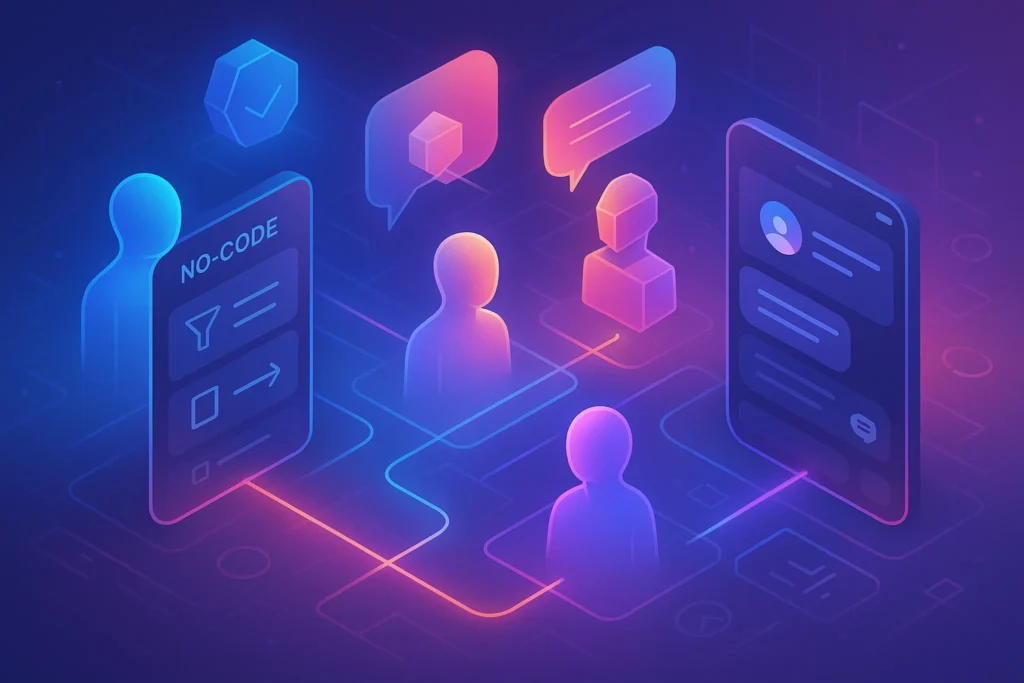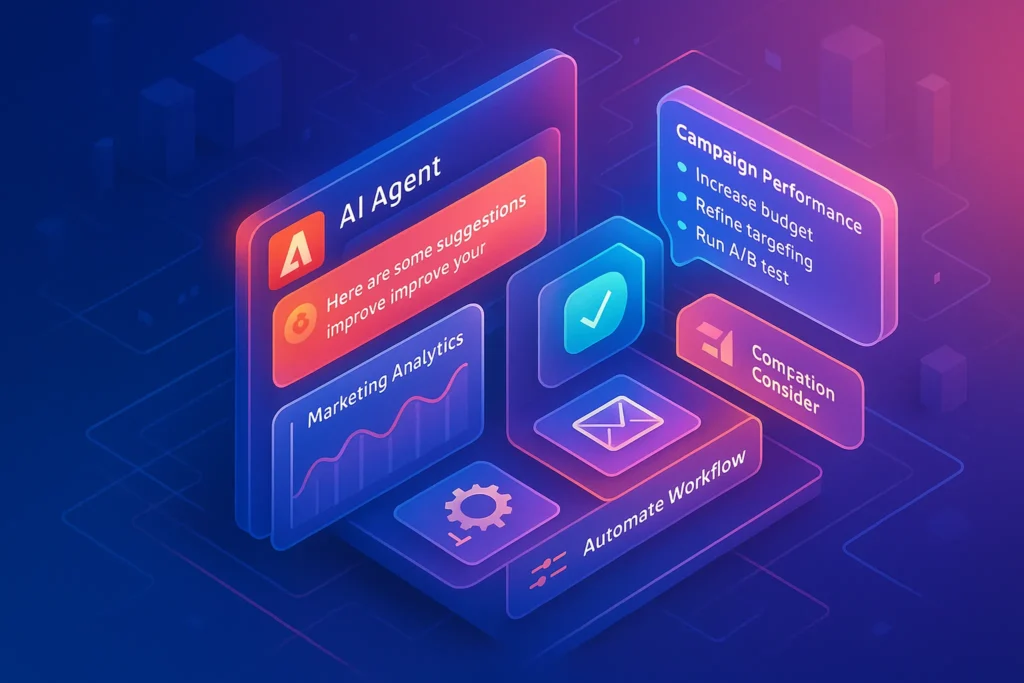-This post may contain affiliate links. If you click on one and make a purchase, I may earn a small commission at no extra cost to you.-
🧠 Introduction – Why AI Agents Are the Next Big Thing
Forget simple chatbots.
AI agents are the new wave—autonomous digital workers that not only respond to commands, but take proactive action. From scheduling meetings to writing code, from fetching live data to creating content—they’re becoming the backbone of next-gen automation.
In this guide, we highlight the top AI agent builders you should try in 2025, especially if you want to launch fast using no-code and GPT integrations.
Whether you’re a solo founder, automation geek, or just AI-curious—there’s something here for you.
🤖 1. Cognosys – Build Smart, Autonomous AI Agents (No Code)
Mini Verdict:
One of the most user-friendly no-code AI agent platforms—perfect for quick deployment and real-world use.
📌 Key Features
-
No-code agent builder with visual editor
-
Supports memory, search, tool integrations
-
Embed agents on websites or internal apps
-
Real-time conversations with autonomous reasoning
-
Integration with GPT, Claude, and Google Search
✅ Pros & Cons
Pros:
✔️ Fast to deploy without coding
✔️ Excellent UI/UX for beginners
✔️ Easy integration with existing workflows
Cons:
❌ Limited advanced developer controls
❌ May need external tools for API-heavy agents
🎯 Best For:
Entrepreneurs, startups, content creators—anyone who wants to build AI agents fast without touching code.
🏆 Comparative Label:
Best for No-Code Founders
🧠 2. AgentOps – Advanced Control for Agent Testing & Optimization
Mini Verdict:
Built for technical users who want full control and observability over AI agents in real-world environments.
📌 Key Features
-
Agent orchestration and evaluation tools
-
Sandbox mode for testing behavior
-
Prompt chaining and refinement
-
Integrates with various LLMs
-
Metrics, logs, and debugging insights
✅ Pros & Cons
Pros:
✔️ Precise testing and fine-tuning workflows
✔️ Ideal for iterative agent development
✔️ Transparent evaluation metrics
Cons:
❌ Not suitable for beginners or no-code users
❌ Requires setup time and context
🎯 Best For:
Technical builders, AI developers, and teams optimizing agent logic.
🏆 Comparative Label:
Best for Agent Debugging and Evaluation
🧩 3. SuperAgent – Open-Source Framework for Custom AI Agents
Mini Verdict:
A flexible, open-source agent platform that’s perfect for developers who want to extend and own their infrastructure.
📌 Key Features
-
Full-stack agent orchestration
-
Built-in support for tool usage and APIs
-
Web UI + CLI for agent control
-
Local or cloud deployment options
-
LLM-agnostic: plug GPT, Claude, etc.
✅ Pros & Cons
Pros:
✔️ Developer-friendly, fully customizable
✔️ No vendor lock-in (open-source)
✔️ Active GitHub community
Cons:
❌ Requires setup + dev skills
❌ UI not as polished as SaaS tools
🎯 Best For:
AI engineers, indie hackers, and anyone who prefers open infrastructure.
🏆 Comparative Label:
Best Open-Source Option
🔄 4. CrewAI – Build Multi-Agent Teams with Defined Roles
Mini Verdict:
If you want multiple AI agents to work together with distinct roles and responsibilities—this is your go-to platform.
📌 Key Features
-
Role-based architecture for agents (e.g. researcher, summarizer, executor)
-
Simple YAML-based config for workflows
-
Agents communicate and collaborate in threads
-
Supports tool execution and memory
-
Integrates with OpenAI + other LLMs
✅ Pros & Cons
Pros:
✔️ Innovative role-structure for AI workflows
✔️ Transparent coordination between agents
✔️ Lightweight and open for customization
Cons:
❌ Still experimental in complex use cases
❌ Requires structured prompts and planning
🎯 Best For:
Tech-savvy creators and teams building AI workflows with multiple steps or responsibilities.
🏆 Comparative Label:
Best for Multi-Agent Collaboration
🧑💼 5. ChatDev – Simulate AI-Powered Startups with Roleplay Agents
Mini Verdict:
A fascinating experiment in multi-agent collaboration—ideal for education, prototyping, and testing coordinated AI systems.
📌 Key Features
-
Simulated roles: CEO, CTO, Developer, PM, etc.
-
Agents collaborate to complete product development tasks
-
Built-in project flow and feedback loops
-
Uses LLMs to simulate decision-making
-
Available as open-source + testable via notebook
✅ Pros & Cons
Pros:
✔️ Great for teaching how AI teams “think”
✔️ Fun for prototyping workflows
✔️ Helps visualize agent role differentiation
Cons:
❌ Not practical for live deployments
❌ Limited extensibility for real-world use
🎯 Best For:
Educators, researchers, and creators exploring agent behavior simulations.
🏆 Comparative Label:
Best for AI Education & Prototyping
🧪 6. AutoGen Studio – Visual Builder for Microsoft’s AutoGen Framework
Mini Verdict:
AutoGen Studio brings structure and clarity to AI agent design with a visual interface—great for building agents that communicate, retrieve, and reason.
📌 Key Features
-
GUI for defining agent roles, memory, and tools
-
Drag-and-drop flow design
-
Real-time execution monitoring
-
Built on Microsoft’s powerful AutoGen backend
-
Supports multi-agent conversation threads
✅ Pros & Cons
Pros:
✔️ Visual design = lower learning curve
✔️ Great for business use cases and automation
✔️ Leverages Microsoft’s research-grade tech
Cons:
❌ Some features still experimental
❌ Lacks community ecosystem like open-source options
🎯 Best For:
Product managers, enterprise AI teams, and automation builders.
🏆 Comparative Label:
Best for Visual Agent Design
🛠️ 7. MetaGPT – AI Teams That Plan, Code, and Build Like Humans
Mini Verdict:
The closest thing to a real dev team—MetaGPT assigns specialized roles to agents to collaborate on product planning, design, and execution.
📌 Key Features
-
Multi-agent architecture with defined job roles
-
Agents simulate Software Engineer, Product Manager, Architect
-
Can generate user stories, code, and specs
-
Great for full-cycle software dev
-
Uses GPT-4 and open frameworks
✅ Pros & Cons
Pros:
✔️ Ideal for software projects and technical users
✔️ Automates product ideation to coding
✔️ Strong community + active GitHub repo
Cons:
❌ Setup complexity may deter beginners
❌ Results vary based on prompts + LLM setup
🎯 Best For:
AI developers, product hackers, and anyone looking to simulate an entire dev team.
🏆 Comparative Label:
Best for End-to-End Software Projects
📊 AI Agent Builders – All at a Glance
| # | Tool | Best For | Key Strength | No-Code Friendly | Open Source |
|---|---|---|---|---|---|
| 1 | Cognosys | No-code founders | Ease of use, quick deployment | ✅ Yes | ❌ No |
| 2 | AgentOps | Agent testers & debuggers | Evaluation, optimization tools | ❌ No | ✅ Yes |
| 3 | SuperAgent | Developers wanting full control | Extensibility, open infrastructure | ❌ No | ✅ Yes |
| 4 | CrewAI | Multi-agent workflow builders | Role-based logic, YAML configs | ⚠️ Medium | ✅ Yes |
| 5 | ChatDev | Educators & prototypers | Agent simulations with roles | ⚠️ Medium | ✅ Yes |
| 6 | AutoGen Studio | Visual design for businesses | GUI for flows, enterprise-ready | ✅ Yes | ❌ No |
| 7 | MetaGPT | AI-powered dev teams | Full software creation pipeline | ❌ No | ✅ Yes |
⚙️ Best AI Agent Stack Combos to Try in 2025
Here are 3 ready-to-launch AI agent stack combos—designed for different types of builders:
🧑💼 For No-Code Founders:
-
Cognosys → No-code builder
-
Zapier/Make → Workflow automation
-
Notion → Agent output storage
-
Framer → Embed agents on a site
💡 Use case: Build a content idea generator agent that fetches trends + stores ideas in Notion.
🧑💻 For Developers Who Want Control:
-
SuperAgent → Custom orchestration
-
LangChain → Prompt chaining
-
Supabase → Agent memory & data
-
Stripe API → For SaaS monetization
💡 Use case: Create an AI support agent that answers product questions with context + logs chat history.
🧠 For Builders Who Want Structure:
-
CrewAI → Role-based multi-agent logic
-
AutoGen Studio → Visual agent flow editor
-
ChatGPT Plugins → Tool integrations
-
Airtable → Structured storage
💡 Use case: Build an internal research agent team: one agent summarizes PDFs, another pulls stats, and a third writes reports.
🧠 Nerd Verdict: Which AI Agent Builder Should You Choose?
If you’re looking to launch fast with zero code, start with Cognosys or AutoGen Studio.
For power users and devs, SuperAgent and MetaGPT offer serious extensibility and control.
Want to simulate real-world teams or build collaborative flows? CrewAI and ChatDev bring structured, multi-agent workflows to life.
There’s no “best” for everyone—but there is a best for your workflow. Test a few, build a quick project, and iterate from there.
🙋♂️ FAQ – Choosing the Right AI Agent Platform
What’s the easiest agent builder for beginners?
Cognosys and AutoGen Studio offer no-code interfaces, great for non-dev users.
Can I use these tools without coding knowledge?
Yes—at least 3 of them are beginner-friendly. Others require technical skills or setup time.
Which tools are free or open-source?
SuperAgent, ChatDev, CrewAI, and MetaGPT are fully open-source and free to use locally.
💬 Would You Bite?
Which AI agent builder caught your attention?
Are you more of a Cognosys kind of founder—or ready to dive deep with MetaGPT?
Drop your thoughts or stack picks in the comments!👇



